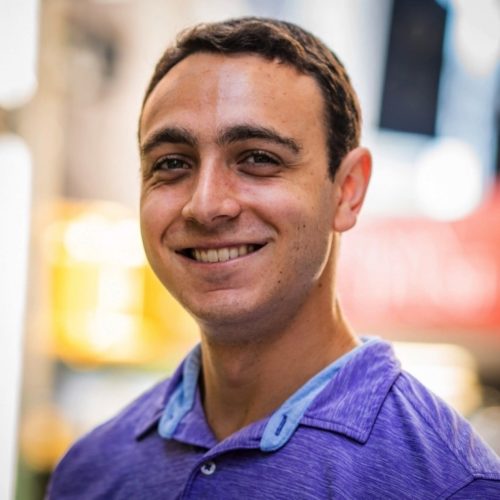
By Kathy Morgenstern
Meet Ken Todd, 53, an Upper West Sider and “long COVID-19” sufferer, or “long hauler,” who is unable to walk comfortably to Central Park from his apartment near Riverside Drive.
Ken was a marathoner before he contracted a mild case of COVID-19 in January 2021, and had always trained in Central Park, but now he can hardly get there.
“Central Park is a little too far,” he says. “Riverside Park has become my new favorite park since it is less than a block away.”
Estimates say that anywhere from “10% to 30% of people might experience long COVID after recovering [from COVID-19]—even if they weren’t very sick in the first place,” according to the American Medical Association.
The AMA defines Long Covid as “a wide range of new, returning or ongoing health problems people may experience more than four weeks after being first infected with SARS-CoV-2. Even people who did not have any symptoms can experience long COVID, which can present as different types and combinations of health problems and can range in lengths of time, according to the Centers for Disease Control and Prevention (CDC).”
“Older people and people with many serious medical conditions are the most likely to experience lingering COVID-19 symptoms,” adds the Mayo Clinic, “but even young, otherwise healthy people can feel unwell for weeks to months after infection.”
Some common signs and symptoms that can linger over time or appear include: fatigue; shortness of breath or difficulty breathing; cough; joint pain; chest pain; memory, concentration or sleep problems; muscle pain or headache; fast or pounding heartbeat; loss of smell or taste; depression or anxiety; fever; dizziness when you stand; worsened symptoms after physical or mental activities.
Dr. Irwin Redlener is the founding Director of the Pandemic Resource and Response Initiative (PRRI) for the National Center for Disaster Preparedness at the Earth Institute of Columbia University. He is also suffering from Long COVID.
Dr. Redlener, who is a public health analyst for MSNBC, has been on the inside watching and learning about COVID-19 since it started infecting people in New York.
“Doctors who are taking care of patients with long COVID are treating them symptom by symptom,” he said, in a telephone interview. “We are at a phase of our understanding of long COVID that we don’t know what the causes of these symptoms are, so we’re treating the symptoms themselves as opposed to the underlying pathology. This is what makes it challenging now. Patients are really being affected and they are looking for answers.”
Unable to work at the beginning of his long COVID journey, Ken was placed on disability for six months. There were no answers as to why he now had to live with “Vestibular dysfunction,” a disturbance of the body’s balance system. After working with many doctors and specialists, Ken is back to a limited work schedule. He works from home four days a week and his routine includes short naps during the day in order to keep up with his workload.
“The biggest hurdle I have to overcome is I can only look at the computer screen for a half-hour or 45 minutes before I start feeling sick and have to stop,” Ken says.
Ken’s physician at Weill Cornell Medicine Primary Care on the Upper West Side suggested that he call Mount Sinai’s Post Covid Care Clinic, which had just opened for those suffering from post-covid symptoms (there was no name for long COVID yet). In April 2021, Ken was referred to a physical therapist at Spear Physical Therapy at 235 West 75th Street (Broadway and WEA), closer to where he lived.

Spear had partnered with Mount Sinai’s Post Covid Care Clinic and started taking the overflow of patients that Mount Sinai couldn’t see back in May of 2020. Eric Finkelstein, Assistant Clinical Director of Spear, usually had a caseload filled with patients suffering from shoulder or back injuries. Since taking in patients from Mount Sinai, he sees 6-8 patients struggling with long COVID symptoms. He says he has readjusted what he had known in order to treat his new patients.
“The spectrum is so variable, and everyone’s symptoms were and are a little different,” Finkelstein said. “A lot of people needed reassurance.”
In January 2021, Finkelstein started working with a man, whose identity he protected, who he ultimately helped get back to a “new normal,” he says. The client, a Ph.D. candidate, came to him with “brain fog” and something that sounded similar to what Ken is still suffering from, but in this case, the patient could not read for longer than 30 minutes.
Finkelstein started treating these long COVID symptoms as if his patient had a concussion. The client was discharged in the early summer and is now able to read up to 4-6 hours at a time. Finkelstein submitted this case study to the Journal of Orthopaedic & Sports Physical Therapy (JOSPT), where it was accepted for publication. His hope is that more physical therapists will become educated about long COVID symptoms and treatment.
On the phone, Ken sounds upbeat, but lets WSR know that just talking for a short while takes a lot out of him. He is trying to be positive, he says, but is unsure about what the future holds. He is also trying not to catch COVID-19 again by meeting friends outside and wearing a mask. He is still going to physical therapy twice a week, and has managed to shop during non-peak hours at both Trader Joe’s and Fairway.
Ken has found a purpose as well: sharing his story with media outlets that are still finding out about long COVID and how it can affect so much of a sufferer’s life. He has been interviewed by Marketplace.org and CNBC’s Make It, telling reporters that getting better after contracting long COVID is “like a full-time job.”
“Up to this point, we have been measuring the pandemic in terms of cases, hospitalizations, and deaths,” Ken concludes. “However, Long COVID — in its many different forms — is a life-changing disability that impacts people’s ability to work, exercise, carry out everyday life activities, and enjoy leisure time. In order to grasp the true impact of COVID, we need to also consider the effect of disability from long COVID on our society and economy.”









Good luck to you, Mr. Todd. It sounds like managing treatment is nearly as exhausting as the illness!
Thank you for this post. I have Long Covid with most of the symptoms above. For me, the hardest part is having people assume I’m just being lazy and trying to convince them that Long Covid is real, it’s not fun and it affects every hour of my day.
This article really demonstrates that there is no one COVID story. Each person experienced the past 2 years in their own way. We each should seek to hear others’ stories, perspectives and experiences about it.
wow, this story really struck a chord. Ken, you are a warrior. Sending you strength and hope.
Just as FYI, Dr. Svetlana Blitshteyn (easily searchable online) has some info on this. This article did not specifically speak to any of the symptoms as dysautonomia, but some are. I know because I had it long before the pandemic, as just one of the comorbidities from my connective tissue disorder. So – while pandemic mess is awful, I am glad there is a chance to get some awareness out for some not-so-known disorders. Maybe more people can get some relief.
Also, some drs feel the long COVID problems are caused by underlying inflammatory component, that if managed early, can be overcome.
All the best.
I did not see how to post my comment, so I am trying to repeat it.
I too and in the same area as Mr. Todd and have almost the same symptoms, but mine are from age. I am 89, and I almost duplicate Long Covid without having had it. I have exactly the same problems except for headaches or heart troubles. I need a rollator when I walk now, so I can feel reassured walking that I will not fall and have an immediate seat if I feel exhausted.Yet, folded on a bus, I can reach zcengral Park, or walk with my rollater the block and a half to Riverside Park.
I too went to Spear to regain my strength and Mr. Finkelstein is a great therapist. So age can disable you as well as Long Covid. Keep positive!
“Long Covid” continues to be a poorly defined constellation of symptoms, nearly all self-reported, whose only common tie is that the people reporting them believe they had Covid, and blame their symptoms on Covid.
It is wrong to make any claims about prevalence of “long covid” in this situation, because there is no definition for the thing itself. Indeed, when studies are done with proper control arms, the prevalence declines dramatically. For example, in one of the largest controlled studies conducted on the issue (>26,000 people), the French CONSTANCES cohort study found that the only symptom correlated with confirmed Covid-19 infection was loss of smell. Every other reported symptom was more strongly associated with *belief* of prior Covid infection, than with confirmed Covid itself.
https://jamanetwork.com/journals/jamainternalmedicine/fullarticle/2785832
While I an certain that these folks are in pain, there’s simply no good reason to believe that their symptoms are caused by Covid, and it’s wrong to present this as a fact.
https://journal.chestnet.org/article/S0012-3692(21)03635-7/pdf
Dear Covid Jones: please see above article and other studies / comment, for example by Dr David Systrom (Brigham and Women’s, Boston), Anne Oaklander, and others. Skin biopsies showing hugely reduced numbers of neurons – peripheral neuropathy. Venous and arterial blood gases assessed during exercise that show poor utilization of oxygen, or “pre-load failure” – too little blood (with too much unused oxygen) coming back to the heart from the limbs – in patients with otherwise healthy and fully functional hearts and lungs! Of course they can barely move and feel exhausted. These are biological findings, not made-up self reports. The underlying mechanisms- neurological, immune-related, etc are not yet understood. Treatments for now can only be – changes of diet, protocols similar to stroke recovery, rest and more rest. (Which sounds 19th century, but that is where our understanding is. We recognize dysautonomia, suspect mitochondrial dysfunction, etc but don’t yet know what to do.) Please recognize that, in a huge variety of different ways that I won’t go in to here, these Long Covid Or PASC patients have measurably bad things going on. Do not deflect or deny this. You disrespect your suffering neighbors when you do. Please read the evidence. I speak having a beloved family member who suddenly began having symptoms of what was eventually diagnosed as ME/CFS 24 years ago. I knew him healthy, and I’ve known him since. He did better than many sufferers, for many years, but it is no joke, no invention, and affects every part of life.
Thanks so much for this very informative article.
Congrats PT Finkelstein – vestibular dysfunction and vertigo is a hard thing to treat or gain recovery from. Author Laura Hillenbrand suffered from that for many years as a primary symptom of her ME/CFS – a similar post viral complex to Long Covid (or PASC – Post acute sequelae of COVID19, as it officially called.) For Ken, great sympathy too and good wishes, and thanks for sharing your story. PEM (post exertional malaise/exhaustion after little exercise), brain fog, neuropathy, dysautonomia…doctors who treat both kinds of patients say early stages of AIDS has a better quality of life. Some who have suffered for decades with ME/CFS and similar know the pain of being reduced to less than a block, when subway stairs used to pose no problem. We can all hope for paths out of these complex and chronic illnesses with the study being done to help Long Covid sufferers.